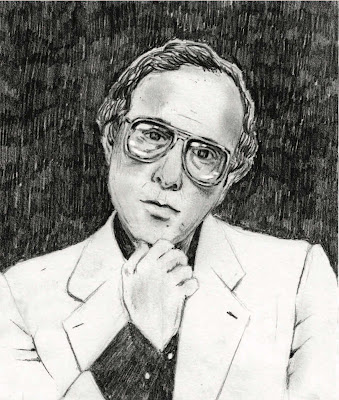Purely Pinteresque: The Elements of Pinter's Language
By Taylor Steinbeck
Most artists take years to establish their voice and style. This wasn’t the case for playwright Harold Pinter. His first West End play, The Birthday Party, showcases the elements of Pinter’s aesthetic that would later be evident throughout his 29 plays and 23 screenplays: the rhythm of colloquial language punctuated by pauses and silences, mysterious characters who rarely say what they mean, and the unsettling, yet witty juxtaposition of comedy and terror. Suspenseful and comical, familiar and foreign, disturbing and alluring, The Birthday Party is quintessential Pinter.
 |
| Graphite drawing of Harold Pinter. By A.C.T. Senior Graphic Designer Brad Amorosino. |
A defining hallmark of Pinter’s style is his use of silences and pauses. Every word and every pause count. “The script of a Pinter play is like sheet music,” says Marco Barricelli, who plays the role of McCann in A.C.T.’s 2018 production of The Birthday Party. “There are dashes, ellipses, pauses, and silences. If you can follow these notations in the script, then you can play it.” The Birthday Party, like many of Pinter’s other works, walks the line between terror and humor, playing with its audience’s emotions. There are moments in the play—a beloved childhood party game, a bowl of cornflakes, a familiar joke—when it’s uncertain whether we should be laughing or screaming, and this uncertainty adds to the suspense. “Pinter wanted his plays to be a good night out,” says director Carey Perloff. “He really cared that it was entertaining, that it was scary, that it was sexy, that it was violent, that it woke you up.”
 |
| Anthony Fusco and Jack Willis in A.C.T.'s 2011 production of The Homecoming. Photo by Kevin Berne. |
“People sometimes come to Pinter thinking, ‘This is going to be really mysterious’ or ‘This is going to be some weird puzzle I have to figure out,’” says actor Anthony Fusco, a veteran of multiple Pinter plays at A.C.T., including The Room (2001) and The Homecoming (2011). “Pinter didn’t write plays to be about anything other than the experience of them. Just trust your experience.”

